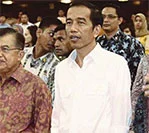OPPOSITION: Indonesia’s new administration will likely face a tough time pushing through its ambitious reform package
THE inauguration of president-elect Joko Widodo, popularly known as Jokowi, and his vice-presidential partner, Jusuf Kalla, today marks a turning point in Indonesia’s history, as a politician with a humble civilian background and with no connections to the established elite of the country assumes the most powerful office in that country. Much is at stake in this event, as are the expectations that have been laid before the Jokowi-Kalla establishment.
Having kept his cards close to his chest all along, Jokowi was reluctant to divulge the names of the members of the cabinet, said to comprise 18 technocrats and 16 seasoned politicians, though it is widely known that much political bargaining had gone into deciding the final line-up.
This new government will face a People’s Representatives Assembly (Dewan Perwakilan Rakyat, or DPR) that is dominated by the opposition, and it is widely expected that many of the reforms that the new government will try to push through will be stalled on the debating floor.
Even then, last-minute developments may turn the tide in favour of the Jokowi-Kalla pairing. Last week, the United Development Party (PPP) went through one of its internal convulsions when the party assembly decided to make Mohammad Romahurmuziy its new chairman, replacing Suryadharma Ali.
The PPP, at present, happens to be one of the parties that is part of the dominant Prabowo Subiantoled Red and White coalition, which currently stands to dominate the DPR. But at the PPP assembly, the winning faction signalled that there was now the possibility that the party might abandon the opposition coalition and jump to the Jokowi-Kalla pact instead.
Even if this were to happen, it would still not be enough to tip the balance in the president’s favour, and it is likely that the stalemate will continue unless, and until, another bigger party jumps across the political divide as well.
As things stand, we are likely to see a beleaguered presidency that will have to fight for every step it takes towards the ambitious reform package that it wishes to push through on a range of issues that span the public domain, from maritime policy, border issues, Indonesia’s role in the Asean region to tackling the problem of logistics and communication in that vast archipelago of a country.
Should the impasse remain, there is the likelihood that Indonesia’s wider ambitions will be thwarted by domestic political scrapes and scuffles, instead, as the parties and coalitions battle it out to block each other’s initiatives, and in the process, delay the transformation that would be necessary for the country’s economic take-off that is long expected.
For the neighbouring countries in the Asean region, the prospect of an Indonesia caught in the grip of domestic political stalemate is not a positive one, what with Asean Economic Integration around the corner, with the Asean Economic Community scheduled for next year.
For all these reasons, Indonesia will remain the country to watch in our region, this year and the year to come.
And the state of Indonesia’s domestic politics is bound to have a spillover effect on the polities and economies of the region.
Article by Dr Farish Noor which appeared in New Straits Times, 20 October 2014





